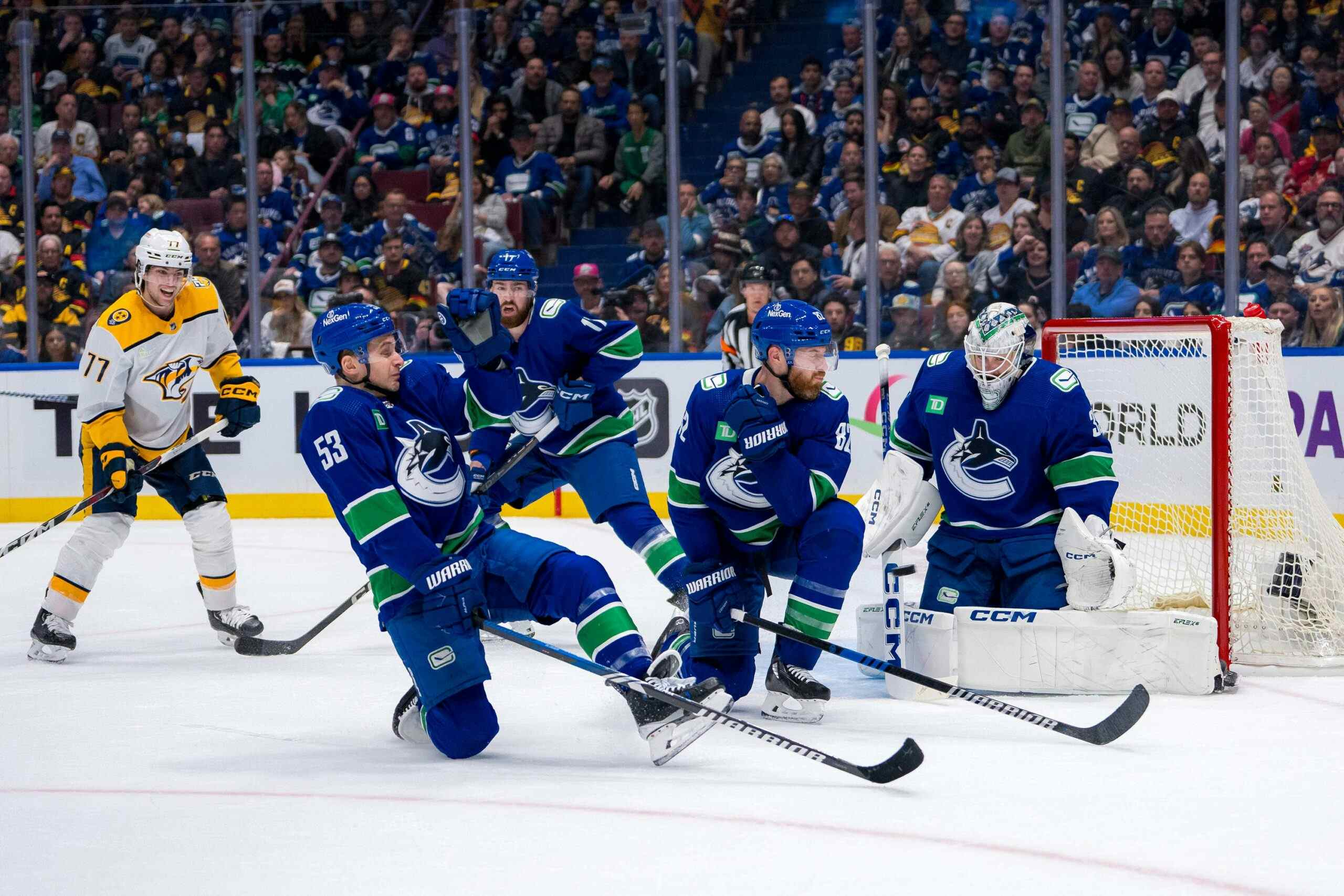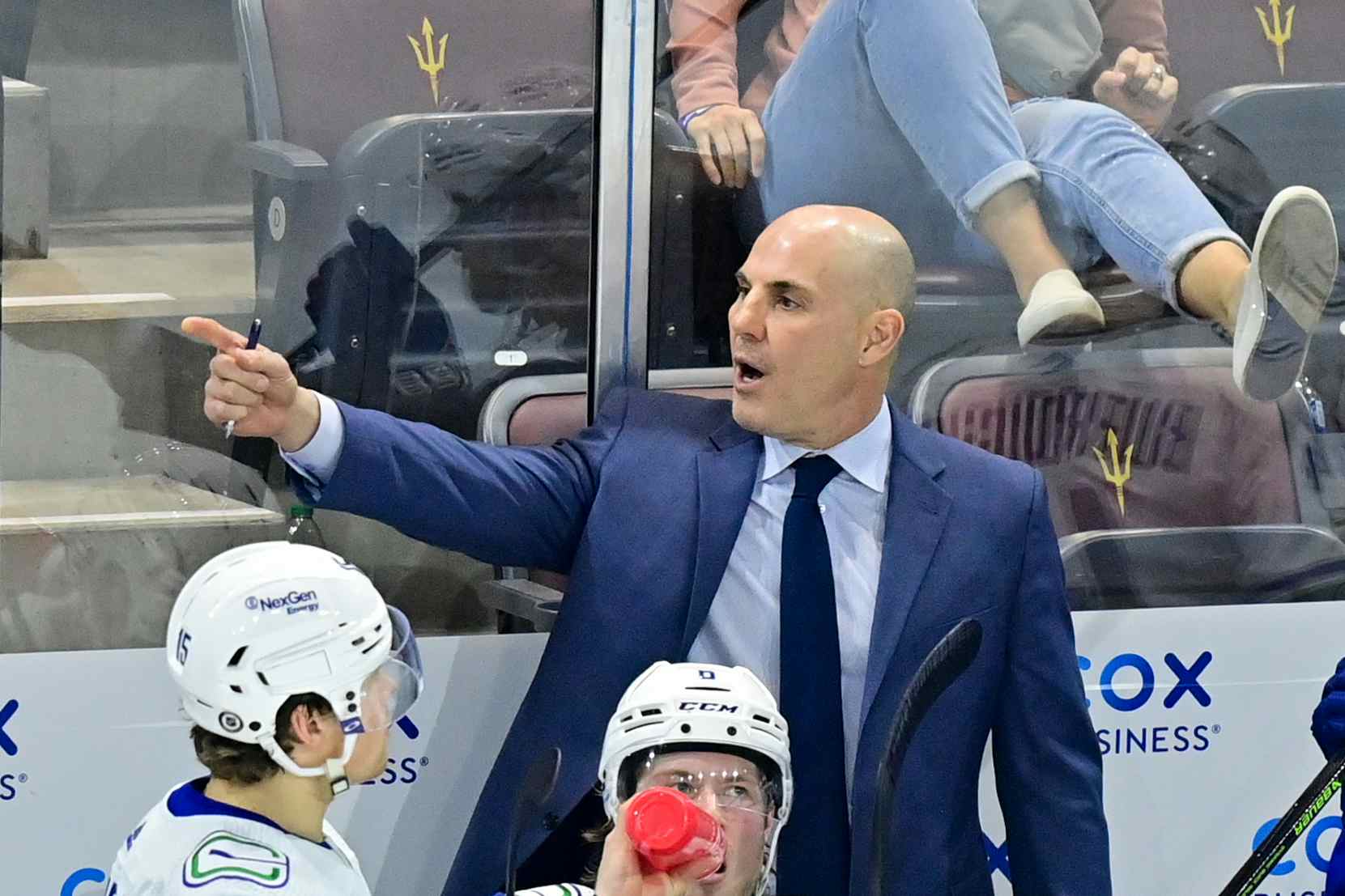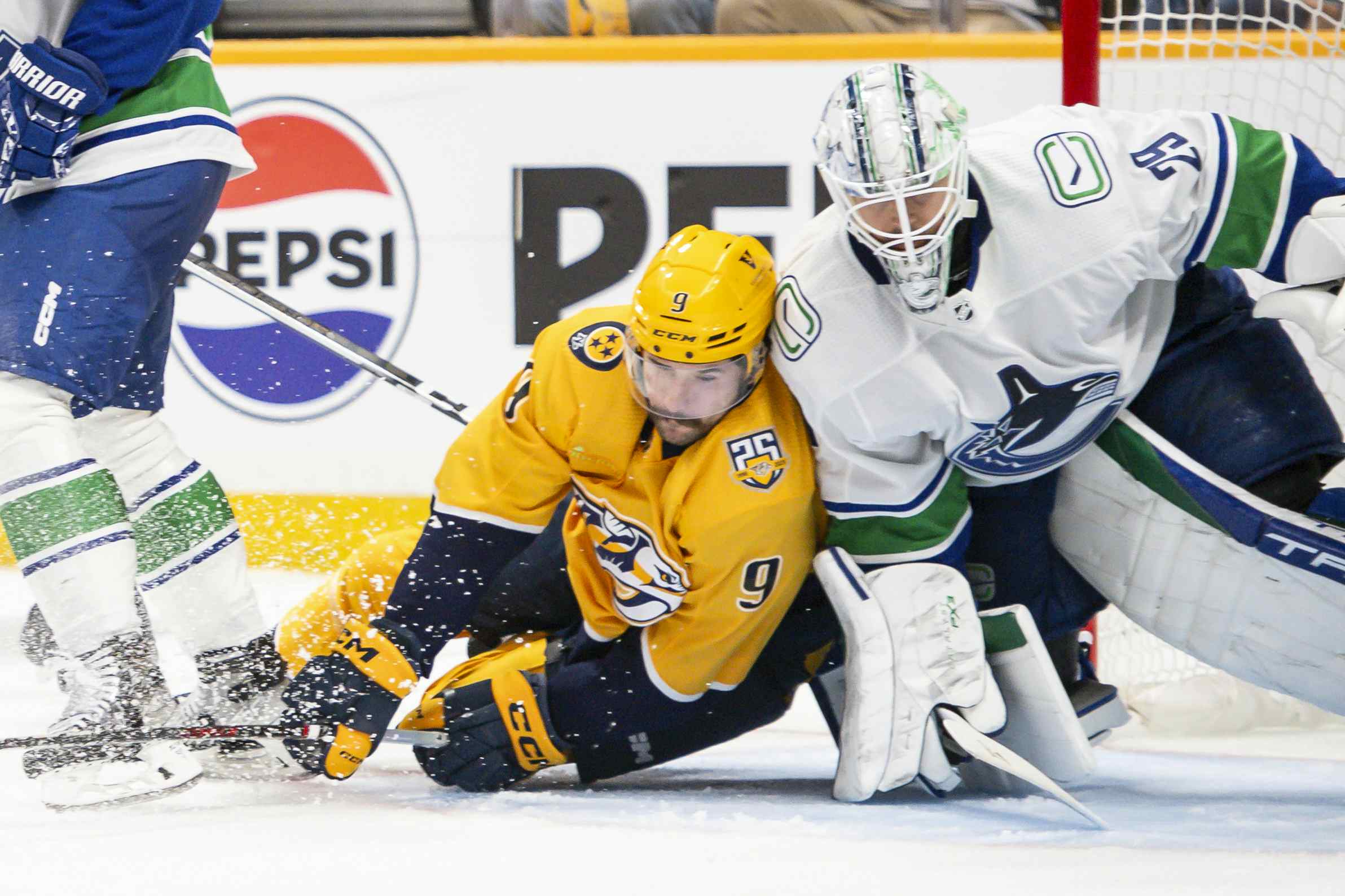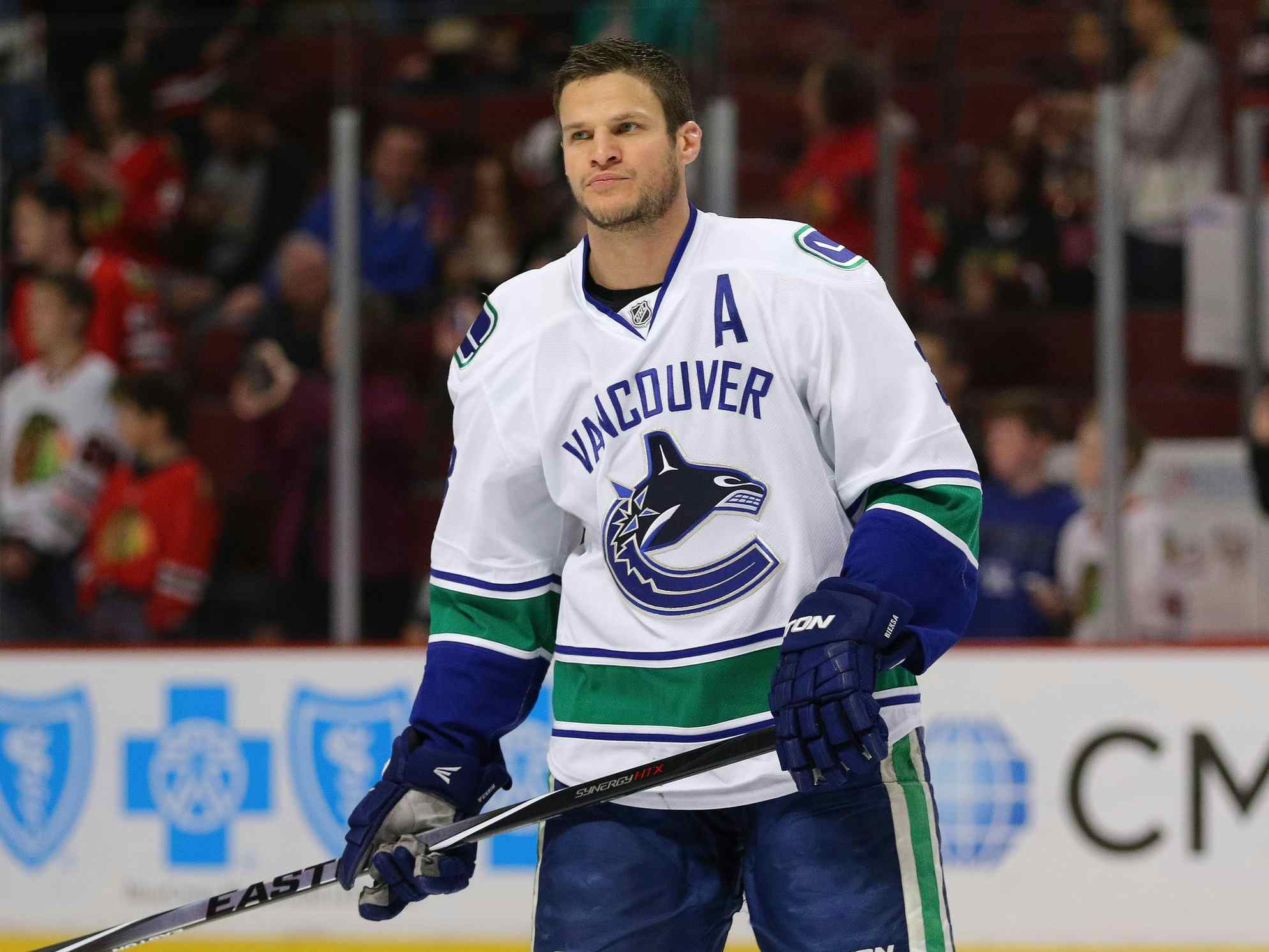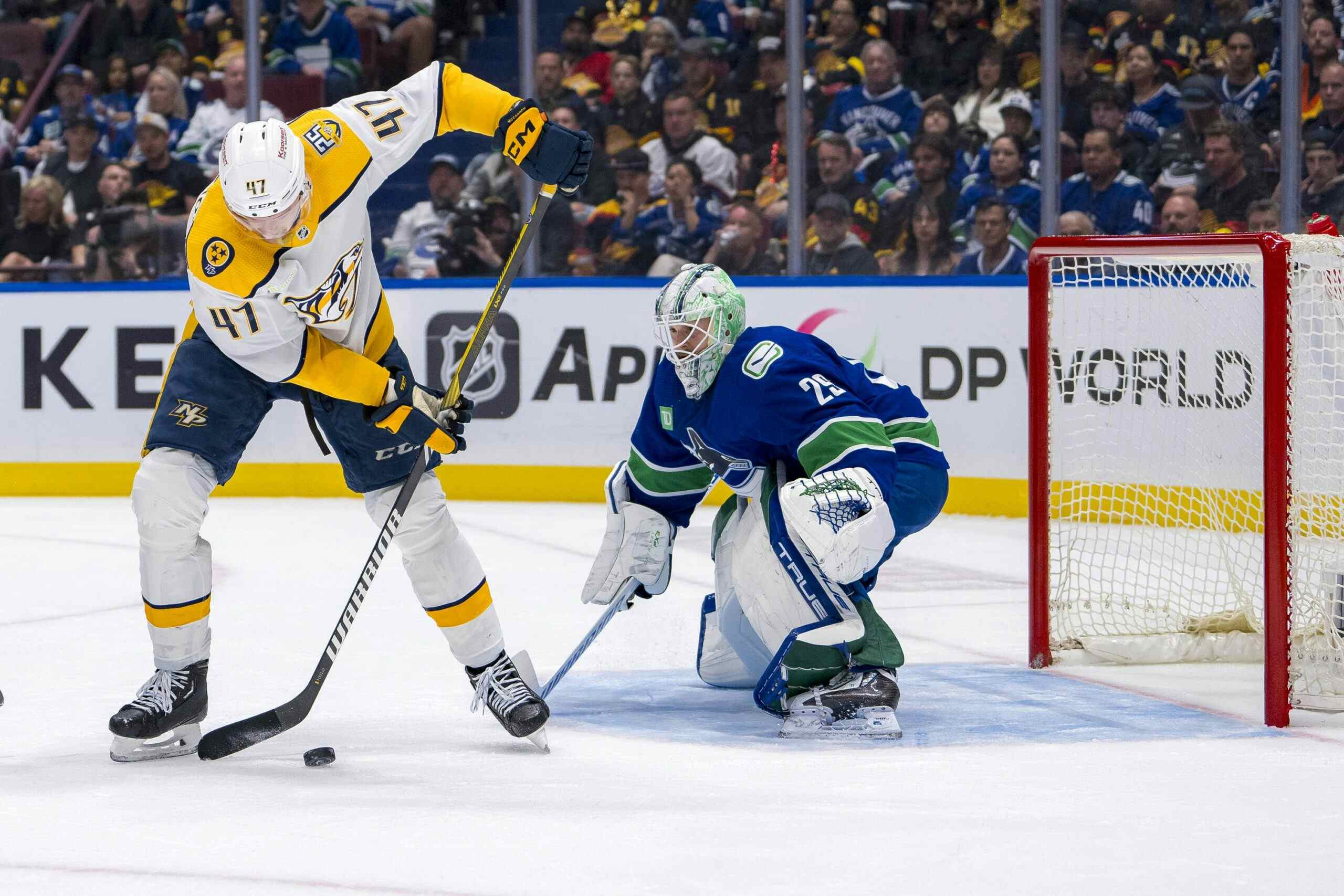Chris Tanev is still unsigned, and that’s okay
By Cam Charron
10 years ago
Chris Tanev is not signed yet to a National Hockey League contract. That is okay. Several players are not signed to National Hockey League contracts that will play hockey games this season, and many of them are more valuable than Chris Tanev. Notable unsigned restricted free agent defencemen are Alex Pietrangelo, Jared Cowen, Cody Franson and T.J. Brodie.
Each defenceman has their own strengths and own weaknesses. The point of this post is not to attempt to guesstimate just what Tanev will make on the open market, but just to point out just how little leverage Tanev has in these negotiations.
Restricted Free Agents and you
It’s part of the process dating back to as far as I can remember. Players without contracts, or free agents, are generally placed into several different categories, but fall into three basic ones. Drafted players, who may only negotiate with the club that has him on its reserve list, Restricted Free Agents, who can negotiate with any team, but the team that owns his rights has the right of first refusal, and Unrestricted Free Agents, who are free to negotiate with any team.
(If you want to follow along, here’s a link to the collective bargaining agreement)
Since Tanev was passed over by every team in the 2008 draft in favour of future superstars like Yann Sauve, Prabh Rai, Mats Froshaug and Morgan Clark, he was eligible to enter the 2009 draft. But he wasn’t, passed over again for future superstars Anton Rodin, Kevin Connauton, Jer—you get the picture.
Before he could enter the 2010 draft, Tanev signed a contract with the Vancouver Canucks, ending his NCAA career at the Rochester Institute of Technology because the NCAA doesn’t allow professional players to play sports against amateurs. Since Tanev was less than 21 when he signed his first contract, he was subject to a three-year entry-level deal.
That ELC covered the 2010-2011, 2011-2012 and 2012-2013 seasons. Now it has expired.
Now, to keep Tanev on the team’s reserve list, the Canucks had to offer Tanev a “qualifying offer”, the effects of which appears to have confused a few people. Tanev let his qualifying offer expire, which does not mean that Tanev is an unrestricted free agent. Not at all. A qualifying offer acts as a mandatory one-year offer that results in a raise for players making below $1-million. Per Article 10.2, since Tanev made between $660K and $1-million on his entry-level deal, his qualifying offer was $1-million.
Under the new collective bargaining agreement, (and this isn’t a change from the old one), since Chris Tanev was signed to his first entry-level deal as a “hockey 20” (he turned 20 between September 16, 2010 and September 15, 2011) he needs four years of professional experience to have arbitration rights, per Article 12.1. He has only three years.
The next wrinkle is unrestricted free agency years. To reach unrestricted free agency, where players make more money because the player is on the open market, a player must have played seven professional seasons or be 27 years old on June 30. That’s still four years away for Tanev.
That means that the only leverage that Tanev could possibly have over the Canucks, if they see him as a core but not critical piece, is off the hope that another team signs Tanev to a contract, or an offer sheet, forcing the Canucks to either match or take draft picks as compensation. In practice, offer sheets don’t happen nearly as much as they should.
To summarize:
- Tanev is still on the Canucks’ reserve list
- The Canucks can match any offer
- Tanev has no arbitration rights
He has very little leverage. In practice, players that hit RFA status for the first time are either awarded long-term contracts or “bridge contracts” that take them to another year of restricted free agency, and arbitration rights.
When a player’s value is lower than you expect it to be over the next several years, a long-term contract would be preferable to a bridge contract. A bridge contract acts as a “prove it” contract, that can be more expensive since the player has more leverage once he hits arbitration status.
You may hear the term “buying up UFA years” which is exactly that. Since a player can make more on unrestricted free agency, teams must pay a premium to buy those years of the contract. If a player is two years closer to his UFA years, even a three-year contract will end up buying out at least one year of unrestricted free agency.
The Canucks would need to sign Tanev to at least a five-year deal to buy up any UFA years. Given Tanev’s inexperience in both a small number of games played in his career plus his usage which sees him play against soft competition, that’s probably not in the cards for them. A long-term contract is a better fit to a player like Roman Josi or P.K. Subban, or any player whose progression is evident but he’s “not quite there” in terms of value. (Hilariously, Subban won a Norris Trophy in the first year of his bridge contract, and will probably cost way more his second time through the RFA process than if the Canadiens had bought a bunch of years at the start)
That’s not Tanev. Tanev has a few distinct talents: he’s a rock solid third pairing player in terms of intelligence and he doesn’t take very many penalties, but he’s stuck in a bottom pairing role for the next few seasons. With Frankie Corrado and Yannick Weber under contract, the Canucks have two more right-shooting defencemen that could play the third pairing, possibly as well as Tanev.
My irrational attachment to Tanev is well-documented, but part of the thing I like about him is that he can be such an effective player for very cheap. He represented a player coming out of college hockey with no discernible talents, just a guy with a good head on his shoulders that could push play in the right direction. But playing for cheap is the main thing. Aaron Rome was much more digestible at $750K than at $1.5-million, and there’s a number the Canucks have in mind for Tanev that makes sense considering he’s a third-pairing player.
Even if he improves, the team should be in no rush to sign him. It’s a cap crunch year, the first time the salary cap has gone down, so saving a couple of hundred thousand dollars means a lot. Signing him so that the roster can be set on July 31st shouldn’t be the way to do business.
As for comparable players, both myself and Thomas Drance found players similar to Tanev, oddly enough, both found on the Minnesota Wild. Marco Scandella signed a $1.025-million two-year deal after his ELC expired, while Jared Spurgeon is making just under $2.7-million. That’s a significant gap, and probably indicative of the fact it’s real tough to properly value non-offensive defencemen.
Nothing has really changed since Harrison Mooney wrote something about Tanev’s RFA negotiations back on July 18th. It would be more worrying if Tanev had some leverage to work with, of if there was the possibility a team would sign him to an offer sheet. The Canucks will eventually sign him to a bridge contract, and it will probably be a number that works for them more than it will for Tanev.
Recent articles from Cam Charron

